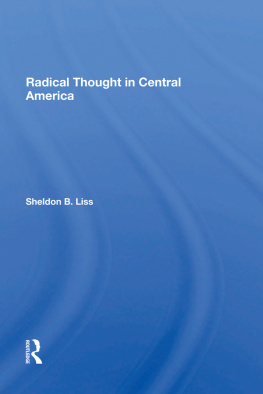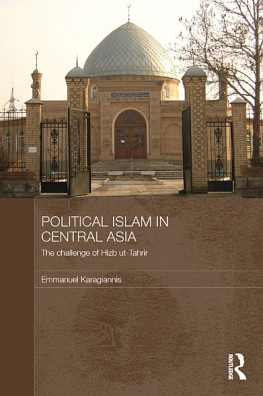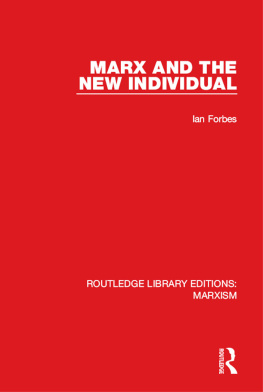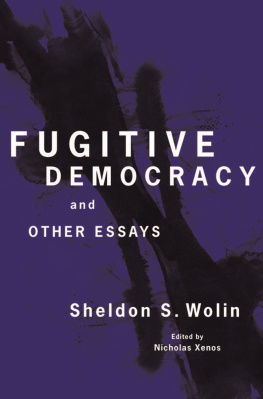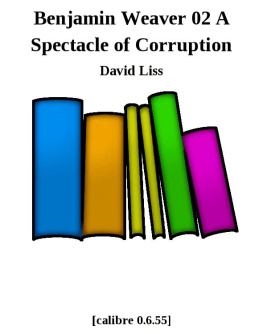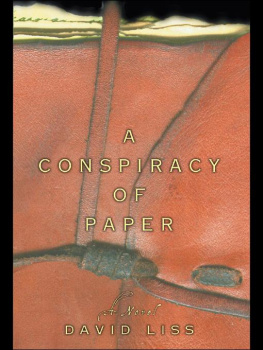Radical Thought in Central America
Latin American Perspectives Series
Ronald H. Chilcote, Series Editor
Dependency and Marxism: Toward a Resolution of the Debate, edited by Ronald H. Chilcote
The Fitful Republic: Economy , Society, and Politics in Argentina, Juan E. Corradi
Latin America: Capitalist and Socialist Perspectives of Development and Underdevelopment, Ronald H. Chilcote and Joel C. Edelstein
Haiti in the World Economy: Class, Race, and Underdevelopment Since 1700, Alex Dupuy
The Battle for Guatemala: Rebels, Death Squads, and U.S. Power, Susanne Jonas
Repression and Resistance: The Struggle for Democracy in Central America, Edelberto Torres Rivas
Radical Thought in Central America, Sheldon B. Liss
Available in hardcover and paperback.
Also by Sheldon B. Liss
Roots of Revolution: Radical Thought in Cuba
Marxist Thought in Latin America
Diplomacy and Dependency: Venezuela, the United States, and the Americas
Man, State, and Society in Latin American History, coeditor with P. K. Liss
The Canal: Aspects of United States-Panamanian Relations
A Century of Disagreement: The Chamizal Conflict, 1864-1964
Radical Thought in Central America
Sheldon B. Liss
First published 1991 by Westview Press
Published 2019 by Routledge
52 Vanderbilt Avenue, New York, NY 10017
2 Park Square, Milton Park, Abingdon, Oxon OX14 4RN
Routledge is an imprint of the Taylor & Francis Group, an informa business
Copyright 1991 by Taylor & Francis
All rights reserved. No part of this book may be reprinted or reproduced or utilised in any form or by any electronic, mechanical, or other means, now known or hereafter invented, including photocopying and recording, or in any information storage or retrieval system, without permission in writing from the publishers.
Notice:
Product or corporate names may be trademarks or registered trademarks, and are used only for identification and explanation without intent to infringe.
Library of Congress Cataloging-in-Publication Data
Liss, Sheldon B.
Radical thought in Central America / Sheldon B. Liss.
p. cm. (Latin American perspectives series)
Includes bibliographical references (p. ) and index.
ISBN 0-8133-8208-4 (hc) ISBN 0-8133-8209-2 (pb)
1. Central AmericaPolitics and government. 2. Central America
Intellectual life20th century. 3. RadicalismCentral America
History20th century. 4. Self-determination, National.
I. Title. II. Series.
F1438.L74 1991
320.9728dc20 91-21144
CIP
ISBN 13: 978-0-367-28492-3 (hbk)
Numerous coworkers in the antiinterveritionist movement and academic colleagues encouraged me to examine the history of radical thought and action in Central America and to present my findings. For over a quarter of a century, countless people from all walks of life in Latin America have imparted their wisdom to me and graciously facilitated my explorations into inter-American relations and radical thought. In the years since the Vietnam War, with the hope of averting similar disasters in the Americas, Central American friends and acquaintances have invited me to analyze the obstacles to, and vehicles for, progress in their region. They have also asked me to convey to the people of my country their ideas, fears, beliefs, and aspirations for a brighter future.
In one way or another, through their assistance, insights, or advice, Nora Astorga, Fernando Cardenal, Susan Chester, James Cockcroft, Lisa Freeman, Richard Harris, Felipe Ixcot, Frank LaRue, Uriel Molina, Tommie Sue Montgomery, Lauren Osborn, Helen Ryan, Gary Ruchwarger, Janet Shenk, Edelberto Torres, Edelberto Torres Rivas, Philip Wheaton, Jaime Wheelock, and Ruben Zamora contributed to this work. Donald Ramos read the entire manuscript and offered extremely thought-provoking suggestions that helped me to reshape its contours. Scholarly and activist friends corrected my errors, and their ideas enabled me to clarify my thoughts, write more precisely, and present a more cohesive book. Sarah Lorenz efficiently processed hundreds of my interlibrary loan requests. Mia O'Connor and Edie Richeson typed the manuscript from my quasi-legible longhand draft, handled three sets of "final" revisions, and probably wondered why I have not entered the modern age of computers and word processors. My Westview Press editors, Barbara Ellington, Alice Colwell, and Jane Raese, turned what is generally the aggravating part of the publication process into a pleasurable experience. A final note of thanks goes to Central America's radical thinkers and writers, especially those about whom I have written. They continually make personal sacrifices to sustain others in the struggle for human dignity and social justice and are an ever-present source of inspiration.
Sheldon B. Liss
- AF of L American Federation of Labor
- AID U.S. Agency for International Development
- AIFLD American Institute for Free Labor Development
- APRA Popular American Revolutionary Alliance
- CACM Central American Common Market
- CIA Central Intelligence Agency
- CIO Congress of Industrial Organizations
- CONDECA Central American Defense Council
- CSUCA Higher Council of Central American Universities
- CTAL Confederation of Latin American Workers
- CTG Confederation of Guatemalan Workers
- EGP Guerrilla Army of the Poor (Guatemala)
- ERP Revolutionary Army of the People (El Salvador)
- FAR Rebel Armed Forces (Guatemala)
- FDR Democratic Revolutionary Front (El Salvador)
- FMLN Farabundo Marti Front for National Liberation (El Salvador)
- FSLN Sandinista National Liberation Front (Nicaragua)
- MR-13 Revolutionary Movement of November 13
- OAS Organization of American States
- ORIT Inter-American Regional Organization of Workers
- ORPA Organization of People in Arms (Guatemala)
- PGT Guatemalan Workers' party
- PLI Independent Liberal party (Nicaragua)
- PLN National Liberation party (Costa Rica)

Introduction
The Fruit Company, Inc. reserved for itself the most succulent, the central coast of my own land, the delicate waist of America. It rechristened its territories as the "Banana Republics" and over the sleeping dead, over the restless heroes who brought about the greatness, the liberty and the flags, it established the comic opera.
Pablo Neruda
This volume deals with the radical segment of Central America's intellectual elite. These radical intellectuals contemplate, discover, clarify, or bring new ideas or theories to the attention of the intelligentsia. They challenge and question a wide range of ideals and ideologies, both abstract and concrete, as they analyze the development of society.
Intellectual life in the five Central American nations is based upon Western traditions. The term intellectuals first became widely used in France in 1898 as a consequence of the manifeste des intellectuels that protested the imprisonment of Alfred Dreyfus, The word referred to individuals with scholarly reputations, outstanding professors, or writers who allegedly represented a national political conscience. In later years intellectuals were often thought of as educated people who aspired to political influence by seeking office or influencing officeholders.

